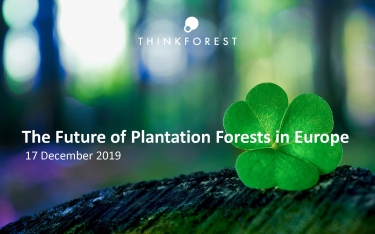3rd International Congress on Planted Forest
The 3rd International Congress on Planted Forests aimed to investigate the contribution of planted forests to sustainable development in the context of global changes. Topics included the sustainability of planted forests in the context of changing climates and the future role of planted forests in environmental protection and REDD+.
Five of the major European Atlantic countries (Spain, France, Ireland, United Kingdom and Portugal) with large areas of planted forests have joined forces to organise this congress under the coordination of the Atlantic Regional Office of the European Forest Institute (EFIATLANTIC), the Food and Agriculture Organization of the United Nations (FAO) and the Unión de Silvicultores del Sur de Europa (USSE).
The congress comprised two successive and complementary events spread over a week:
1. Three parallel scientific workshops, each held in a European Atlantic city (Bordeaux, Dublin and Porto) on the16 and 17 May, followed by a field excursion focusing on issues discussed in the workshop on 18 May.
2. A plenary meeting held in Estoril near Lisbon in Portugal on 20 and 21 May.
Participants were able to register for both the workshop of their choice and for the plenary meeting. Alternatively, it was possible to attend either one of the workshops or the plenary meeting.
Context and Objectives
Two international conferences on planted forests have been previously held in Chile in 1999 and in New Zealand in 2003. Both of these conferences highlighted the need to promote the multiple dimensions of Sustainable Forest management (SFM) in view of the social and environmental challenges of the 21 st century.
Since then, new research, global assessments of planted forest resources and outlook studies for wood from planted forests, best practice guidelines and many interesting cases of country applications from around the world have documented and further emphasized the global significance of planted forests. In parallel, international processes and financing mechanisms have increasingly recognized the central role of planted forests for mitigating climate changes, conserving biodiversity and combating land degradation. In contrast to these positive developments, negative social and environmental impacts of planted forests have given rise to concern.
It is therefore timely to investigate the contribution of planted forests to sustainable development in the context of global changes and to have organized this Third International Congress on Planted Forests.
Current issues surrounding planted forests were addressed, alongside their productive, environmental and social functions and the challenges they present. The target audience included scientists, policy makers, forest and resource economists, forest investment managers, the private forest sector and forest managers, as well as the wood industry, pulp and paper companies, bioenergy actors and the carbon market sector.
The proceedings have now been published in the New Zealand Journal of Forestry Science. Both html and pdf versions of all the papers are available here.

